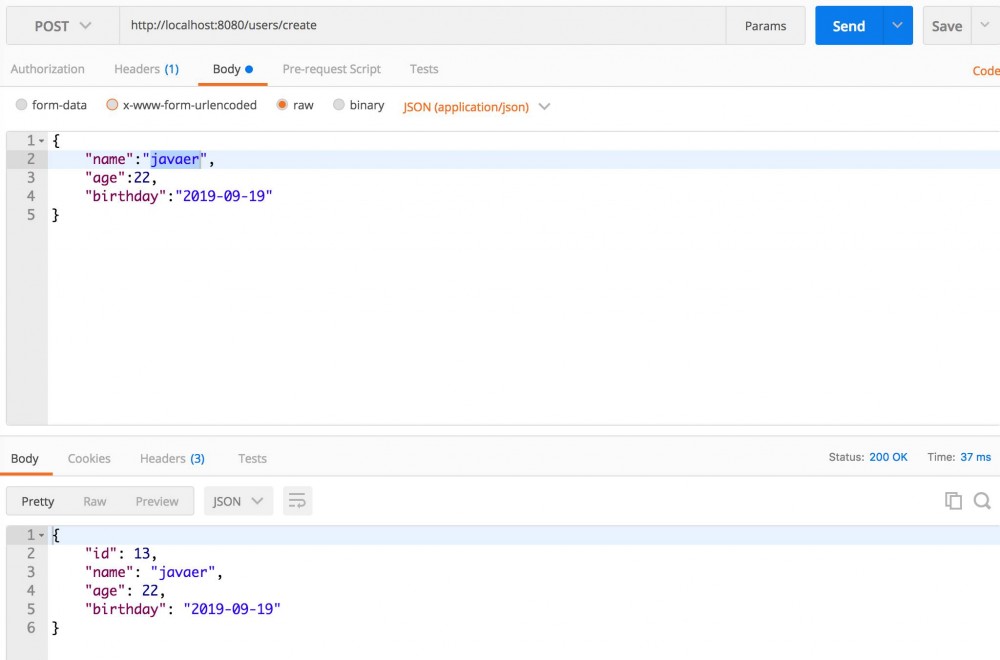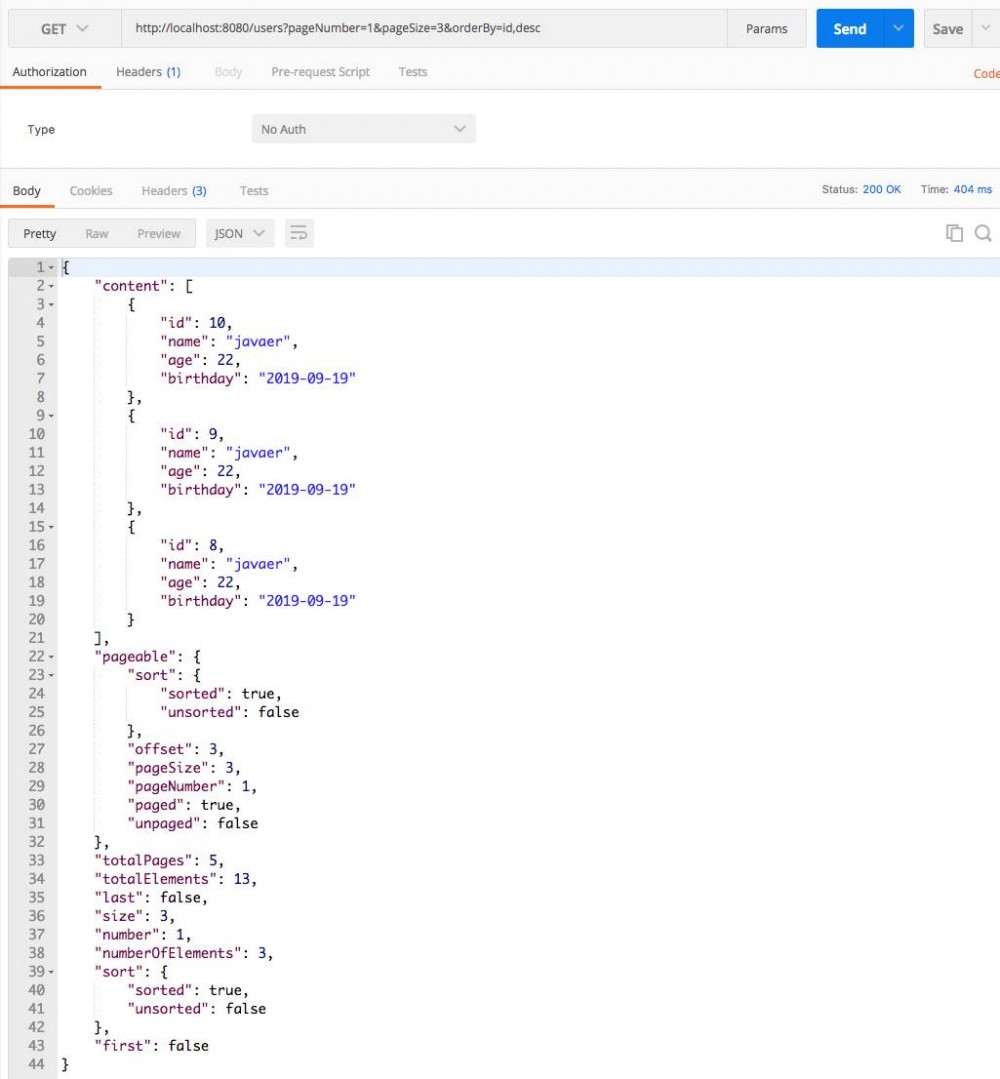Spring Boot 2.x 小新功能 – Spring Data Web configuration
摘要: 原创出处 www.bysocket.com 「泥瓦匠BYSocket 」欢迎转载,保留摘要,谢谢!
不赚钱,是一个创业者的最大耻辱。先赚钱,活得好,再谈发展,这才是最重要的
四、小结
运行环境:Mac OS 10.12.xJDK 8 +Spring Boot 2.0.0.M4
一、前言
Spring Data Web configuration
Spring Boot exposes a new spring.data.web configuration namespace that allows to easily configure paging and sorting.
就是说,可以在 application.properties 中自定义分页和排序相关的默认值和参数名。
具体见地址:https://github.com/spring-projects/spring-boot/wiki/Spring-Boot-2.0.0-M2-Release-Notes
二、运行工程
项目结构如下图所示:
org.spring.springboot.controller – Controller 层
org.spring.springboot.domain – 实体类及数据操作层 DAO
org.spring.springboot.service – 业务逻辑层
PagingSortingApplication – 应用启动类
application.properties – 应用配置文件,应用启动会自动读取配置
具体详细结构如下:
├── pom.xml
└── src
├── main
│ ├── java
│ │ └── spring
│ │ └── boot
│ │ └── core
│ │ ├── PagingSortingApplication.java
│ │ ├── domain
│ │ │ ├── User.java
│ │ │ └── UserRepository.java
│ │ ├── service
│ │ │ ├── UserService.java
│ │ │ └── impl
│ │ │ └── UserServiceImpl.java
│ │ └── web
│ │ └── UserController.java
│ └── resources
│ ├── application.properties
│ └── static
└── test
2.编译工程
在项目根目录 spring-boot-core-book-demo,运行 maven 指令去编译工程:
mvn clean install
3.运行工程
在 chapter-5-spring-boot-paging-sorting 工程中,右键运行 PagingSortingApplication 应用启动类的 main 函数。待控制台日志中看到启动成功后。
在 PostMan 工具中,新增用户几个:
POST http://localhost:8080/users/create
Content-Type: application/json
{
“name”:”javaer”,
“age”:22,
“birthday”:”2019-09-19″
}
如图:
 重复上面步骤,新增用户 13 个。
重复上面步骤,新增用户 13 个。
然后,调用分页查询用户列表接口:
GET http://localhost:8080/users?pageNumber=1&pageSize=3&orderBy=id,desc
如图:

可见,查询出第 2 页的用户数据,并且按 id 倒序。还有可见,返回了分页相关的数据:每页大小(这里是 3 个)、排序、总个数和总页数等。
从应用日志中也可以看出对应的 HQL :
2017-09-20 14:46:16.630 INFO 14593 — [nio-8080-exec-4] s.b.core.service.impl.UserServiceImpl :
分页查询用户: PageNumber = 1 PageSize = 3
2017-09-20 14:46:16.703 INFO 14593 — [nio-8080-exec-4] o.h.h.i.QueryTranslatorFactoryInitiator : HHH000397: Using ASTQueryTranslatorFactory
Hibernate: select user0_.id as id1_0_, user0_.age as age2_0_, user0_.birthday as birthday3_0_, user0_.name as name4_0_ from user user0_ order by user0_.id desc limit ? offset ?
Hibernate: select count(user0_.id) as col_0_0_ from user user0_
三、工程配置详解
<?xml version="1.0" encoding="UTF-8"?>
<project xmlns="http://maven.apache.org/POM/4.0.0" xmlns:xsi="http://www.w3.org/2001/XMLSchema-instance"
xsi:schemaLocation="http://maven.apache.org/POM/4.0.0 http://maven.apache.org/xsd/maven-4.0.0.xsd">
<modelVersion>4.0.0</modelVersion>
<groupId>spring.boot.core</groupId>
<artifactId>chapter-5-spring-boot-paging-sorting</artifactId>
<version>0.0.1-SNAPSHOT</version>
<packaging>jar</packaging>
<name>chapter-5-spring-boot-paging-sorting</name>
<description>第五章数据分页排序案例</description>
<parent>
<groupId>org.springframework.boot</groupId>
<artifactId>spring-boot-starter-parent</artifactId>
<version>2.0.0.M4</version>
<relativePath/> <!-- lookup parent from repository -->
</parent>
<properties>
<project.build.sourceEncoding>UTF-8</project.build.sourceEncoding>
<project.reporting.outputEncoding>UTF-8</project.reporting.outputEncoding>
<java.version>1.8</java.version>
</properties>
<dependencies>
<!-- Web 依赖 -->
<dependency>
<groupId>org.springframework.boot</groupId>
<artifactId>spring-boot-starter-web</artifactId>
</dependency>
<!-- 单元测试依赖 -->
<dependency>
<groupId>org.springframework.boot</groupId>
<artifactId>spring-boot-starter-test</artifactId>
<scope>test</scope>
</dependency>
<!-- Spring Data JPA 依赖 :: 数据持久层框架 -->
<dependency>
<groupId>org.springframework.boot</groupId>
<artifactId>spring-boot-starter-data-jpa</artifactId>
</dependency>
<!-- h2 数据源连接驱动 -->
<dependency>
<groupId>com.h2database</groupId>
<artifactId>h2</artifactId>
<scope>runtime</scope>
</dependency>
</dependencies>
<build>
<plugins>
<!-- Spring Boot Maven 插件 -->
<plugin>
<groupId>org.springframework.boot</groupId>
<artifactId>spring-boot-maven-plugin</artifactId>
<version>1.5.1.RELEASE</version>
</plugin>
</plugins>
</build>
<repositories>
<repository>
<id>spring-milestones</id>
<name>Spring Milestones</name>
<url>https://repo.spring.io/libs-milestone</url>
<snapshots>
<enabled>false</enabled>
</snapshots>
</repository>
</repositories>
</project>
简单依赖了 Web 依赖、Spring Data JPA 依赖 :: 数据持久层框架,并且使用 h2 内存式数据源。
2.在 application.properties 应用配置文件,增加相关分页排序参数
## 是否显示 SQL 语句
spring.jpa.show-sql=true
## DATA WEB 相关配置 {@link SpringDataWebProperties}
## 分页大小 默认为 20
spring.data.web.pageable.default-page-size=3
## 当前页参数名 默认为 page
spring.data.web.pageable.page-parameter=pageNumber
## 当前页参数名 默认为 size
spring.data.web.pageable.size-parameter=pageSize
## 字段排序参数名 默认为 sort
spring.data.web.sort.sort-parameter=orderBy
关于 Data Web 分页和排序相关的配置:
设置 spring.data.web.pageable.default-page-size 可修改分页大小,默认分页大小为 20
设置 spring.data.web.pageable.page-parameter 可修改当前页参数名,默认参数名为 page
设置 pring.data.web.pageable.size-parameter 可修改当前页参数名,默认参数名为 size
设置 spring.data.web.sort.sort-parameter 可修改字段排序参数名,默认参数名为 sort
这里我们修改了各个参数名。如果什么都不设置的话,分页排序查询接口地址如下:
GET http://localhost:8080/users?page=1&size=3&sort=id,desc
这里就是,Spring 2.x 更新了一个小小的功能即:
就是说,可以在 application.properties 中自定义分页和排序相关的默认值和参数名。
3.用户持久层操作接口 UserRepository
/**
* 用户持久层操作接口
*
* Created by bysocket on 18/09/2017.
*/
public interface UserRepository extends PagingAndSortingRepository<User, Long> {
}
接口只要继承 PagingAndSortingRepository 类即可。默认会提供很多实现,比如 CRUD 相关的实现。支持的默认方法有: count(), findAll(), findOne(ID), delete(ID), deleteAll(), exists(ID), save(DomainObject), save(Iterable<DomainObject>)。
最重要的是,
PagingAndSortingRepository 提供了两个接口
Iterable<T> findAll(Sort sort);
Page<T> findAll(Pageable pageable);
用来支持 分页 和 排序 的获取数据接口。
4.用户业务层实现类 UserServiceImpl
/**
* User 业务层实现
*
* Created by bysocket on 18/09/2017.
*/
@Service
public class UserServiceImpl implements UserService {
private static final Logger LOGGER = LoggerFactory.getLogger(UserServiceImpl.class);
@Autowired
UserRepository userRepository;
@Override
public Page<User> findByPage(Pageable pageable) {
LOGGER.info(" /n 分页查询用户:"
+ " PageNumber = " + pageable.getPageNumber()
+ " PageSize = " + pageable.getPageSize());
return userRepository.findAll(pageable);
}
@Override
public User insertByUser(User user) {
LOGGER.info("新增用户:" + user.toString());
return userRepository.save(user);
}
}
这边没有具体的业务操作,就打印了对应业务层分页相关的参数。
5.用户控制层 UserController
/**
* 用户控制层
*
* Created by bysocket on 18/09/2017.
*/
@RestController
@RequestMapping(value = "/users") // 通过这里配置使下面的映射都在 /users
public class UserController {
@Autowired
UserService userService; // 用户服务层
/**
* 获取用户分页列表
* 处理 "/users" 的 GET 请求,用来获取用户分页列表
* 通过 @RequestParam 传递参数,进一步实现条件查询或者分页查询
*
* Pageable 支持的分页参数如下
* page - 当前页 从 0 开始
* size - 每页大小 默认值在 application.properties 配置
*/
@RequestMapping(method = RequestMethod.GET)
public Page<User> getUserPage(Pageable pageable) {
return userService.findByPage(pageable);
}
/**
* 创建用户
* 处理 "/users" 的 POST 请求,用来获取用户列表
* 通过 @RequestBody 绑定实体类参数
*/
@RequestMapping(value = "/create", method = RequestMethod.POST)
public User postUser(@RequestBody User user) {
return userService.insertByUser(user);
}
}
这里实现了两个 HTTP 服务接口。这次主要在实现 getUserPage 方法,利用分页参数来进行。
page – 当前页 从 0 开始
size – 每页大小 默认值在 application.properties 配置
其他不明白的,可以git clone 下载工程 spring-boot-core-book-demo,工程代码注解很详细,项目地址见 GitHub –
https://github.com/JeffLi1993/spring-boot-core-book-demo。
四、小结
还是温故知新,加上一些 Spring 2.x 小新功能 – Spring Data Web configuration
欢迎扫一扫我的公众号关注 — 及时得到博客订阅哦!
— http://www.bysocket.com/ —
— https://github.com/JeffLi1993 —

- 本文标签: http 创业 IO 数据 web XML schema git JPA cat CTO db 分页 core tar NIO UI apache json 创业者 ip 下载 description springboot 代码 tab REST src plugin 配置 java Select final ACE grep Spring Boot GitHub 测试 插件 lib js 业务层 map spring DOM dependencies pom 博客 find id IDE 编译 value build https Service sql 目录 App maven 参数
- 版权声明: 本文为互联网转载文章,出处已在文章中说明(部分除外)。如果侵权,请联系本站长删除,谢谢。
- 本文海报: 生成海报一 生成海报二











![[HBLOG]公众号](https://www.liuhaihua.cn/img/qrcode_gzh.jpg)

